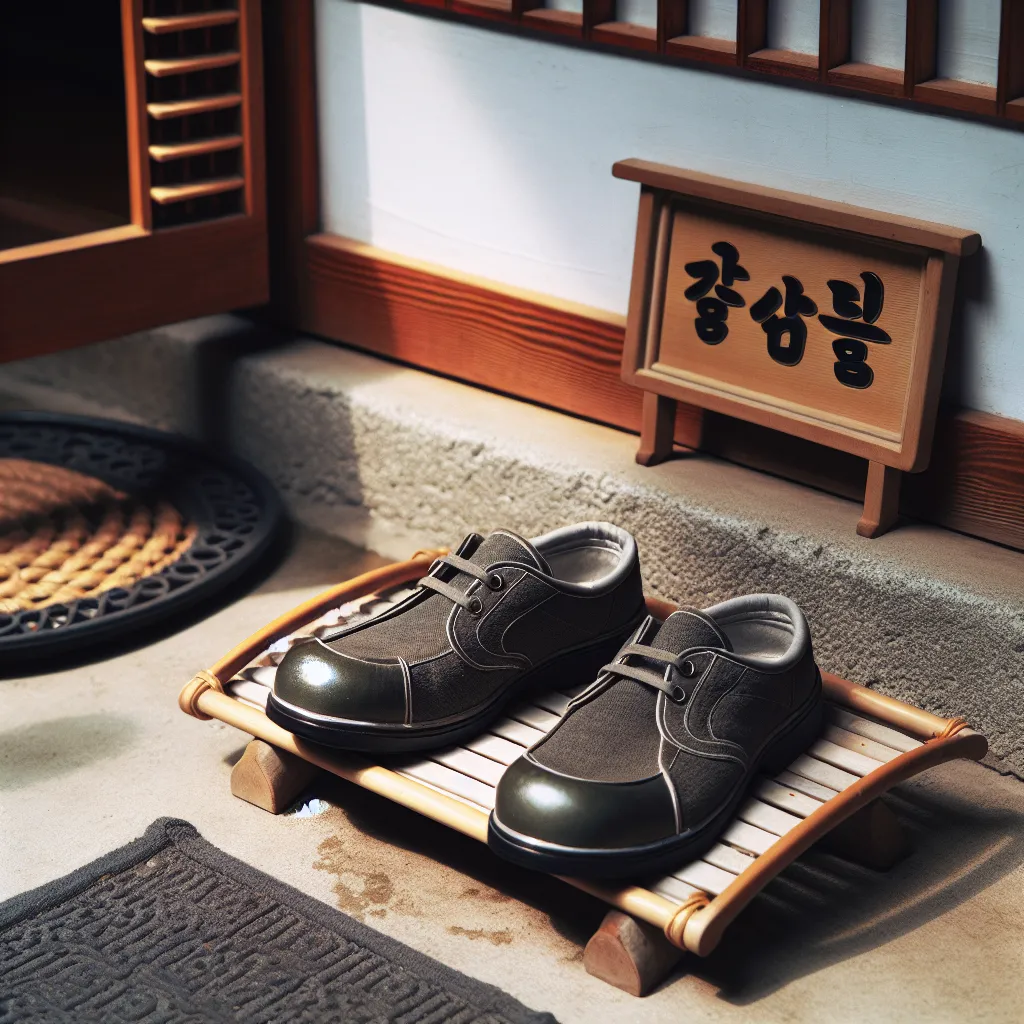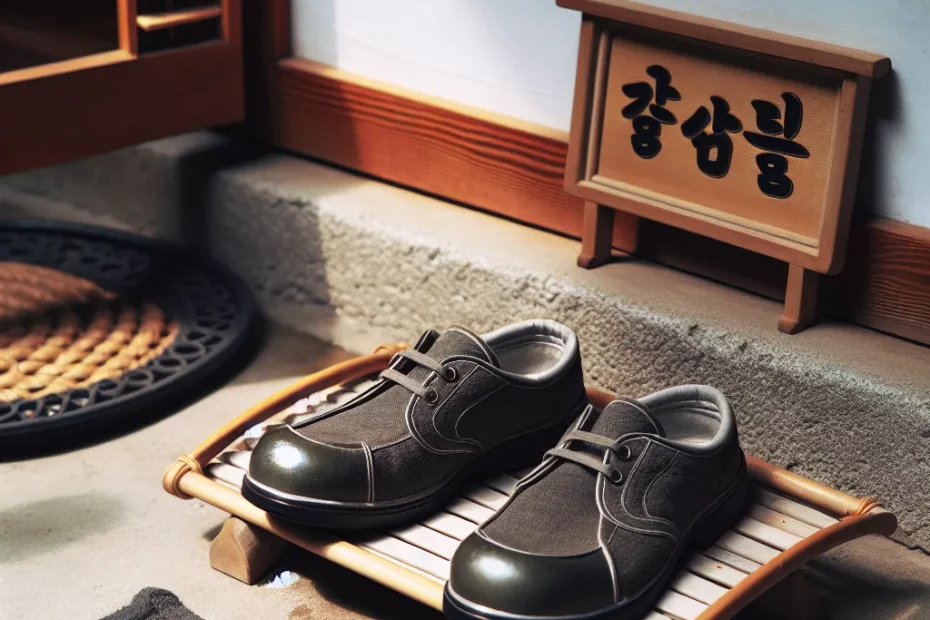As we step into someone’s home, it’s essential to show respect for their culture and traditions. In Korean households, one of the most important customs is removing shoes before entering. This simple act not only maintains cleanliness but also signifies a deep-rooted tradition of respect and hospitality. By adhering to this custom, we not only keep the home clean but also create a welcoming environment for both the hosts and guests. Let’s explore why this practice is crucial in Korean culture and how it reflects the values of respect and cleanliness that are deeply ingrained in Korean society.

Why Removing Shoes is Important in Korean Culture
Hey there! Today, let’s dive into the fascinating world of Korean culture and explore why removing shoes before entering a home is such a big deal. In Korean households, taking off your shoes isn’t just a simple act of politeness; it’s a deeply ingrained tradition rooted in respect, cleanliness, and harmony.
The Significance of Hygiene
First and foremost, let’s talk about hygiene. Did you know that the average shoe sole can harbor up to 421,000 units of bacteria? That’s right – your shoes are basically a breeding ground for all sorts of germs and dirt. By leaving your shoes at the door, you’re not only keeping your living space clean but also preventing harmful bacteria from spreading around the house.
The Importance of Respect
But it’s not just about cleanliness; it’s also about showing respect. In Korean culture, the floor is considered a sacred space where the family gathers, eats, and relaxes. By removing your shoes, you’re symbolically leaving the outside world behind and entering a space of intimacy and connection. It’s a way of honoring the home and its inhabitants, showing that you value their well-being and comfort.
Symbol of Humility
Moreover, taking off your shoes is a sign of humility and humility. In Korean Confucian tradition, the act of bowing and removing one’s shoes is a gesture of humility and respect towards others. It’s a way of acknowledging the presence of others and putting their needs above your own. So, the next time you visit a Korean household, remember to kick off those shoes and step into a world of tradition, respect, and harmony.
In Conclusion
In conclusion, removing shoes before entering a Korean home is not just a cultural practice; it’s a reflection of values like cleanliness, respect, and humility. By embracing this tradition, you’re not only showing your appreciation for Korean culture but also participating in a ritual that fosters harmony and connection. So, let’s kick off those shoes and step into a world of tradition, one respectful step at a time!
That’s all for now! Stay tuned for more insights into the rich tapestry of Korean culture. Cheers to a shoe-free and respectful living space!
Maintaining Cleanliness in Korean Homes
Hey there, folks! Today, let’s dive into the wonderful world of Korean homes and talk about the importance of maintaining cleanliness. When you step into a Korean household, you’re not just entering a physical space; you’re stepping into a realm of tradition, respect, and harmony.
The Significance of Cleanliness in Korean Culture
In Korean culture, cleanliness is not just about scrubbing floors and dusting shelves. It’s a way of life, a reflection of one’s values and respect for others. Korean homes are often impeccably clean, with a place for everything and everything in its place. From the entrance, where you’ll find neatly arranged shoes, to the living room, where cushions are fluffed just right, every corner exudes a sense of order and serenity.
Did you know that in Korea, it’s customary to remove your shoes before entering someone’s home? This practice isn’t just about keeping the floors clean; it’s a sign of respect for the space and the people who live there. By taking off your shoes, you’re showing that you honor the household and value its cleanliness. So, next time you visit a Korean home, remember to kick off those shoes and show your hosts some love!
But it’s not just about shoes – maintaining cleanliness in Korean homes goes beyond the surface. Koreans take pride in their homes, often spending hours each day tidying up and organizing. From folding laundry with precision to scrubbing pots and pans until they sparkle, every task is done with care and attention to detail.
In Korean culture, cleanliness is also closely tied to health and well-being. A clean home is believed to promote good fortune and positive energy, while clutter and dirt are thought to invite bad luck. So, by keeping their homes spotless, Koreans not only create a pleasant living environment but also strive for a harmonious and balanced life.
So, the next time you’re in a Korean home, take a moment to appreciate the effort that goes into maintaining cleanliness. From the sparkling floors to the neatly made beds, every detail reflects a deep-seated respect for the space and the people who inhabit it. And who knows, you might even pick up a tip or two on how to keep your own home squeaky clean!
In conclusion, maintaining cleanliness in Korean homes is not just about chores – it’s a way of life, a reflection of values, and a symbol of respect. So, let’s all take a page from the Korean book of cleanliness and strive to create spaces that not only look beautiful but also radiate positive energy and harmony. Cheers to clean homes and happy hearts! 🏡✨
Respecting Traditional Customs and Etiquette
When entering a Korean household, one of the most important customs to observe is to remove your shoes before stepping inside. This practice is deeply rooted in Korean culture and holds significant meaning in terms of respect and cleanliness. By taking off your shoes at the door, you are showing reverence for the home and its inhabitants.
The Significance of Removing Shoes
Taking off your shoes is not just a simple act of politeness; it is a way to maintain the cleanliness of the home. In Korean culture, the floor is considered a sacred space where people sit, eat, and socialize. By leaving your shoes at the door, you are helping to keep the floors clean and free from dirt and germs.
Respect Towards the Host
Moreover, removing your shoes before entering a Korean home is a sign of respect towards the host. It shows that you acknowledge and appreciate the effort they put into maintaining their living space. In Korean society, showing respect for elders and hosts is highly valued, and taking off your shoes is a gesture that reflects this cultural value.
Symbolism of Taking Off Shoes
In addition to cleanliness and respect, taking off your shoes also symbolizes leaving behind the worries and troubles of the outside world. It is a way to transition from the chaotic external environment to the peaceful sanctuary of the home. By shedding your shoes, you are symbolically shedding the stress and negativity of the day, allowing yourself to relax and unwind in a safe space.
So, the next time you visit a Korean household, remember to show respect by removing your shoes at the door. Not only will you be following a time-honored tradition, but you will also be demonstrating your appreciation for Korean culture and customs. Let’s step into homes with reverence and consideration, one shoe at a time!
Remember, respecting traditional customs and etiquette is a beautiful way to connect with different cultures and show appreciation for their values and beliefs. Let’s embrace these practices with an open heart and a willingness to learn from one another.
Creating a Welcoming Environment by Removing Shoes
Hey there, welcome to the discussion on the importance of removing shoes before entering a Korean household. 🏠👞 Let’s dive into why this simple act can make a big difference in creating a warm and respectful atmosphere for both guests and hosts alike.
The Significance of Removing Shoes in Korean Culture
In Korean culture, taking off your shoes before entering a home is more than just a tradition; it’s a sign of respect and cleanliness. 🇰🇷👟 By removing your shoes, you are showing that you honor the space of the household and value the efforts the hosts put into maintaining a clean and comfortable environment for everyone.
The Hygienic Benefits of Shoe Removal
Did you know that according to a study conducted by the University of Houston, shoes can carry an average of 421,000 units of bacteria? 😱 Imagine bringing all that bacteria into someone’s home! By leaving your shoes at the door, you are not only keeping the floors clean but also preventing the spread of germs and bacteria.
Preserving the Home’s Flooring
Moreover, taking off your shoes can also help preserve the flooring of the house. In Korean homes, it is common to have clean and beautiful traditional wooden floors. 👣🌿 By removing your shoes, you are preventing scratches, scuffs, and dirt from damaging the floors, ultimately helping the hosts maintain their home in top condition for years to come.
Creating Comfort and Relaxation
But it’s not just about cleanliness and maintenance; it’s also about creating a sense of comfort and relaxation. 🛋️💖 Walking around barefoot or in cozy socks can make you feel more at ease and at home, allowing you to fully enjoy your visit without any discomfort.
So, the next time you visit a Korean household or any home for that matter, remember the significance of removing your shoes. It’s a small gesture that goes a long way in showing respect, maintaining cleanliness, and fostering a welcoming environment for everyone. 👠✨
Let’s all take a step towards a cleaner, more respectful, and cozier environment by simply slipping off our shoes at the door. Your hosts will appreciate it, and you’ll feel right at home in no time! 🏡🌟
As we wrap up our discussion on the importance of removing shoes before entering a Korean home, let’s remember that this simple act goes a long way in showing respect for Korean culture and traditions. By understanding and following this custom, we not only maintain cleanliness in the household but also create a warm and welcoming environment for both residents and guests. So, next time you visit a Korean home, remember to kick off your shoes at the door – it’s a small gesture that speaks volumes about your consideration and appreciation for Korean customs. Let’s continue to embrace and honor these traditions as a way to connect and show respect to our Korean friends and hosts.
